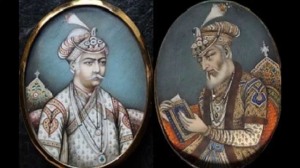What do Tulsidas, Surdas, Kabir, Rahim Das & Tansen have in common? They all lived and created immortal art during Akbar’s reign. Each in his own way created not just pieces of art but a way of living and thinking about art and spirituality that persists today. From architecture to music to cuisine to language to poetry to religion itself, Indian and Persian streams mixed and mingled, and Islam became an integral part of India. This was the first attempt by ay ruler, Hindu or Muslim, to create a state neutral to and tolerant of all religious ideas.
 This openness of thinking, this blooming of art and philosophy, this idea of a ruler meant to rule, not impose his views, these are all traditions of a great king. In the era before capitalism, it was also the duty of the ruler to ensure patronage of arts and artists. To provide them with platform, sustenance, opportunity and freedom. This tradition continued for the next two generations, till Aurangzeb happened. Much is made of his anti-liberalism. Mostly correct. Much is also made of how he lived a simple life. Also correct. But lost in this is how he damaged culture and economy.
This openness of thinking, this blooming of art and philosophy, this idea of a ruler meant to rule, not impose his views, these are all traditions of a great king. In the era before capitalism, it was also the duty of the ruler to ensure patronage of arts and artists. To provide them with platform, sustenance, opportunity and freedom. This tradition continued for the next two generations, till Aurangzeb happened. Much is made of his anti-liberalism. Mostly correct. Much is also made of how he lived a simple life. Also correct. But lost in this is how he damaged culture and economy.Akbar left a prosperous, mostly peaceful empire. Akbar appointed Raja Todarmal who introduced keeping strict records of wealth and land, and ended the arbitrary rule by having an appointed hierarchy of officials. Akbar, Jehangir and Shahjahan also held open courts where work and justice was done. This was the real hard work of ruling. Managing day to day affairs. Where was Aurangzeb during his five decade long rule? On the horseback or in camps, fighting wars.
Not only did he saw a large number of rebellions, and inspired heroes like Shivaji, Guri Teg Bahadur, Kushal Khan, he also led the largest expansion of Mughal empire. Some point to this with pride, and compare him to Ashok the great. They are fools. This expansion was costly. It left the rich Mughal regime weak and poor. He was so often in war that he never really managed the state. And so blind was he to talent that he kept appointing bad Nawabs, either incapable or corrupt or both. When your rule is the start of decline of your empire, it is nothing to be proud of, really.
 He not only banned making new temples, and had a number of them destroyed, he also stopped all patronage to arts. We have a long discontinuity in poetry. Much later we had talents like Ghalib and Mir again supported by the Mughal state. Alas, it was too late by then. The poisoned legacy of misrule and mistrust was too deep. Marathas were the largest powers by the time British took over India, and Mughals just symbolic heads in and around Delhi.
He not only banned making new temples, and had a number of them destroyed, he also stopped all patronage to arts. We have a long discontinuity in poetry. Much later we had talents like Ghalib and Mir again supported by the Mughal state. Alas, it was too late by then. The poisoned legacy of misrule and mistrust was too deep. Marathas were the largest powers by the time British took over India, and Mughals just symbolic heads in and around Delhi.Oh and by the way, those who profess that the Brits were scared of Aurangzeb and stayed away: patently false. British made a stronghold in Bombay during his reign and conducted one of the most profitable acts of piracy in history when they captured a Mughal convoy returning from Mecca.
Aurangzeb did the magic trick of converting a prosperous, tolerant, dynasty – rich in both means and culture – into a hated, shrinking rule by increasingly small men. The small men started with him. For one who doesn’t understand what makes his nation great does not deserve to rule it. This nation was made great by people like Kabir, Tulsi, Tansen, Todarmal and Akbar. Not by narrow minded bigots.




























